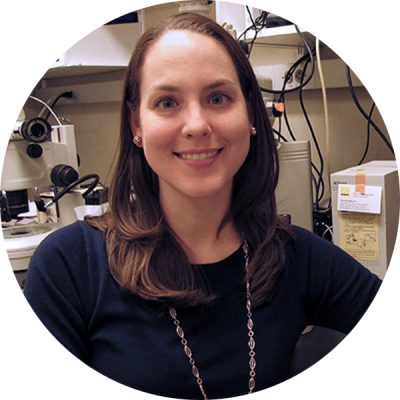
Shira Ziegler
In Hal Dietz’s laboratory, I focused my doctoral research on pseudoxanthoma elasticum (PXE) — a rare genetic disorder of ectopic calcification, characterized by calcification in the skin, eyes and blood vessels. We discovered that defects in extracellular adenosine triphosphate metabolism drive ectopic calcification in PXE and identified a therapeutic intervention that successfully treated the disease both in vitro and in a PXE mouse model. We believe these findings will not only help patients with this rare disorder, but also inform our approaches to treating more common conditions, such as aortic valve calcification and chronic kidney disease-associated vascular calcification.
Questions & Answers
Why did you choose Johns Hopkins for your work?
I chose Johns Hopkins for its unwavering commitment to training physician-scientists. I was inspired by the faculty and students and wanted to be part of a community focused on patient-driven research.
What does receiving this award mean to you personally and professionally? Do you have any connection with the particular award you received?
Dr. Paul Talalay was the founder and first director of the Johns Hopkins M.D./Ph.D. program. I admire his continued dedication to the M.D./Ph.D. program — he still attends our retreats! I am honored to receive the award bearing his name.
What contributed to your project’s success (special skills, interests, opportunities, guidance, etc.)?
My research was motivated by our patients. During graduate school, I had the opportunity to see patients with PXE and other rare disorders of ectopic calcification. We learned from each other; they taught me about manifestations of their disease and I shared with them our advances in the laboratory. Working on a human disease and interacting with patients provides immeasurable insight and perspective and helps move basic discoveries into the clinic.
What thoughts do you have about Young Investigators’ Day itself, as a celebration of the roles students and fellows play in research at Johns Hopkins?
Young Investigators’ Day is a special opportunity to learn about the breadth of innovative research at Johns Hopkins. Independent research is challenging; it requires vision, persistence and careful, often tedious work — it is important to celebrate graduate students and postdoctoral fellows and their accomplishments.
What has been your best/most memorable experience while at Johns Hopkins?
Minutes after passing my graduate school qualifying exam, a postdoctoral fellow in the Dietz laboratory convinced me to go sailing. I had never been before! We headed to the docks, rigged a boat and we were off — speeding on the waves of Chesapeake Bay! Over the next couple of months, he taught me how to skipper, and now I take other laboratory members and friends out sailing.
What are your plans over the next year or so?
I will continue my training at Johns Hopkins, completing a residency in the Harriet Lane combined pediatrics and medical genetics program. I am deeply committed to translational research and fluidity between the clinic and the laboratory. Dual pediatrics and genetics training will allow me to better care for patients, identify relevant research questions and hopefully translate new findings into effective therapies.
Tell us something interesting about yourself that makes you unique. Do you have any special hobbies, interests or life experiences?
I enjoy exploring, hiking and backpacking through the national parks with my family — favorites include Shenandoah, Acadia and Yosemite.